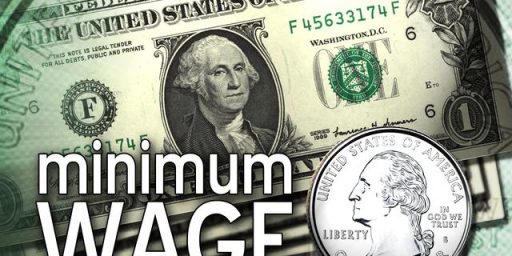John Stossel: Wage Gap Economics, Not Discrimination
John Stossel points out the illogical of the “wage gap” argument in a piece at TownHall.com, “The wage gap, give me a break.”
Feminists keep demanding new laws to protect women from the so-called wage gap. Many studies have found that women make about 75 cents for every dollar a man earns. Activists say the pay difference is all about sexism. “No matter how hard women work, or whatever they achieve in terms of advancement in their own professions and degrees, they will not be compensated equitably!” shouted Rep. Rosa DeLauro, D-Conn., at a “wage equity” rally in Washington, D.C. But how could this be possible? Suppose you’re an employer doing the hiring. If a woman does equal work for 25 percent less money, businesses would get rich just by hiring women. Why would any employer ever hire a man?
Martha Burk, chair of the National Council of Women’s Organizations, gave me this simple answer: “Because they like to hire men, John. They like to hire people like themselves and they darn sure like to promote people like themselves.” In other words, men so love their fellow men that they are willing to pay a premium of, say, $10,000 on what would otherwise be a $30,000-a-year job, just for the sheer pleasure of employing a man. Nonsense. It’s market competition that sets wages.
That certainly seems reasonable. Employers don’t seem to care about workers who “look like them” when hiring illegal aliens at a fraction of what an American citizen would cost.
What’s the explanation, then?
Men do care about money — and that, not wage discrimination, is why men tend to make more of it. “Women themselves say they’re far more likely to care about flexibility,” says author Warren Farrell. “Men say, I’m far more likely to care about money.” Farrell spent about 15 years going over U.S. Census statistics and research studies. His research found that the wage gap exists not because of sexism, but because more men are willing to do certain kinds of jobs. “The average full-time working male works more than a full-time working female,” Farrell said.
[…]
“We have been suckered into believing that because there are more men at the top than women at the top, that this is a result of discrimination against women. That’s been the misconception. It’s all about trade-offs. You earn more money, you usually sacrifice something at home,” Farrell said.
Suppose two people have equal potential, but one takes on more demanding, consuming, lucrative jobs while the other places a higher priority on family. The one who makes work the focus will be more productive for an employer than the one who puts his or her home life first. The latter will get more of the pleasures of family. So he (and it tends to be “he”) will make more money, even though she would be equally productive and equally rewarded if she made the same choices. “Women and men look at their life,” said Farrell, “and women say, ‘What do I need? Do I need more money, or do I need more time?’ And women are intelligent enough to say, I need more time. And so women lead balanced lives. Men should be learning from women.”
One irony is that some people, especially young women, may make the choices that lead to the pay gap precisely because they have been taught the job market shortchanges women. Women who see the market as hostile may put their hearts into their homes instead of their careers — thus making less money.
But the market isn’t hostile. The market is just. It rewards you for the work you do, not for the work you choose not to do. If men want the family time many women have, we must accept lower financial rewards — and if women want the money, they have to work like money-grubbing men.
Seems about right to me. And I say that as a man who has generally made the “female” choice–a job that is intellectually satisfying and relatively comfortable even though not as finally lucrative as I’d like. It’s a choice I occasionally lament in a society that judges our “worth” by our annual salary.
If I had it to do over again, though, I still wouldn’t choose to be a plumber or an accountant or a corporate lawyer. Those jobs pay quite well but are aggravating and/or require absurdly long hours. What good is money if you don’t have time to enjoy it.






As oposed to racial issues, how about looking at the connection between monetary disparity and cultural issues?
http://www.amptoons.com/blog/archives/category/21/the-wage-gap-series/
But the market isn’t hostile. The market is just. It rewards you for the work you do, not for the work you choose not to do.
I agree that the market isn’t hostile to women, but it damn sure isn’t “just,” either. That wouldn’t explain the obscene salaries paid to CEOs, star athletes and hollywood actors.
The market’s definition of justice carries no moral component that would make it punish CEOs, athletes or actors. The market rewards based on the demand for the product and nothing else.
Seen in those terms, Stossel is right — but it’s an understanding of the word most people aren’t familiar with. Maybe he should have put it differently, but the point stands.
The market’s definition of justice carries no moral component that would make it punish CEOs, athletes or actors.
That’s a new definition of justice to me, and no doubt to about 99 percent of the rest of the world. What is “justice” without a moral component, McGehee?
Anyway, the point stands. The demand for CEOs would stand regardless of the obscene salaries they are given. Ditto athletes and movie stars.
bryan: But the market isn’t just demand, it’s also supply. The supply of superstar quarterbacks who can take a team to the Super Bowl is exceedingly small. Ditto CEOs who can turn a multi-billion dollar conglomerate around.
And if you’re a woman seeking a job for which a man would certainly be negotiating and not taking the first offer, you’d best do the same.
So many women don’t.
hln
Ditto CEOs who can turn a multi-billion dollar conglomerate around
Actually, I could find plenty of CEO candidates who could do what CEOs did to Enron or WorldCom. In fact, from what I’ve seen, CEO pay has very little to do with their record in past jobs or even with present performance of their companies, except on the margins. And getting fired is the ultimate perk, because they get massive buyouts.
As for quarterbacks who can take their teams to the Super Bowl, that’s a little bit misleading as well.
Rich Gannon,
Jim Plunkett
Tony Eason
Mark Rypien
Neil O’Donnell
Brad Johnson
Jake Delhomme
Trent Dilfer
Kerry Collins
Any of those names ring a bell? They all went to the super bowl. None of them I’d classify as super star quarterbacks. And then there’s the Ryan Leaf factor to consider.
And as for Hollywood, somebody should be punished for some of the crap they put out (like, say, Ishtar, half of Adam Sandler’s movies, and Steven Seagal).
bryan: Market determines price. Plunkett was a #1 overall pick and a huge bust, until he finally reached his potential with the Raiders as a veteran. Presumably, though, teams would pay QBs minimum salary if they thought that was the best way to compete. The best course, certainly, is to get lucky on a 6th round pick and have him pay dividends before the second contract.
The CEOs issue is fuzzier, since the board has some conflicts of interest. Still, one presumes they would prefer to pay their CEO $100k rather than $1 mil ceteris parabas.
http://discussions.pbs.org/viewtopic.pbs?t=28529